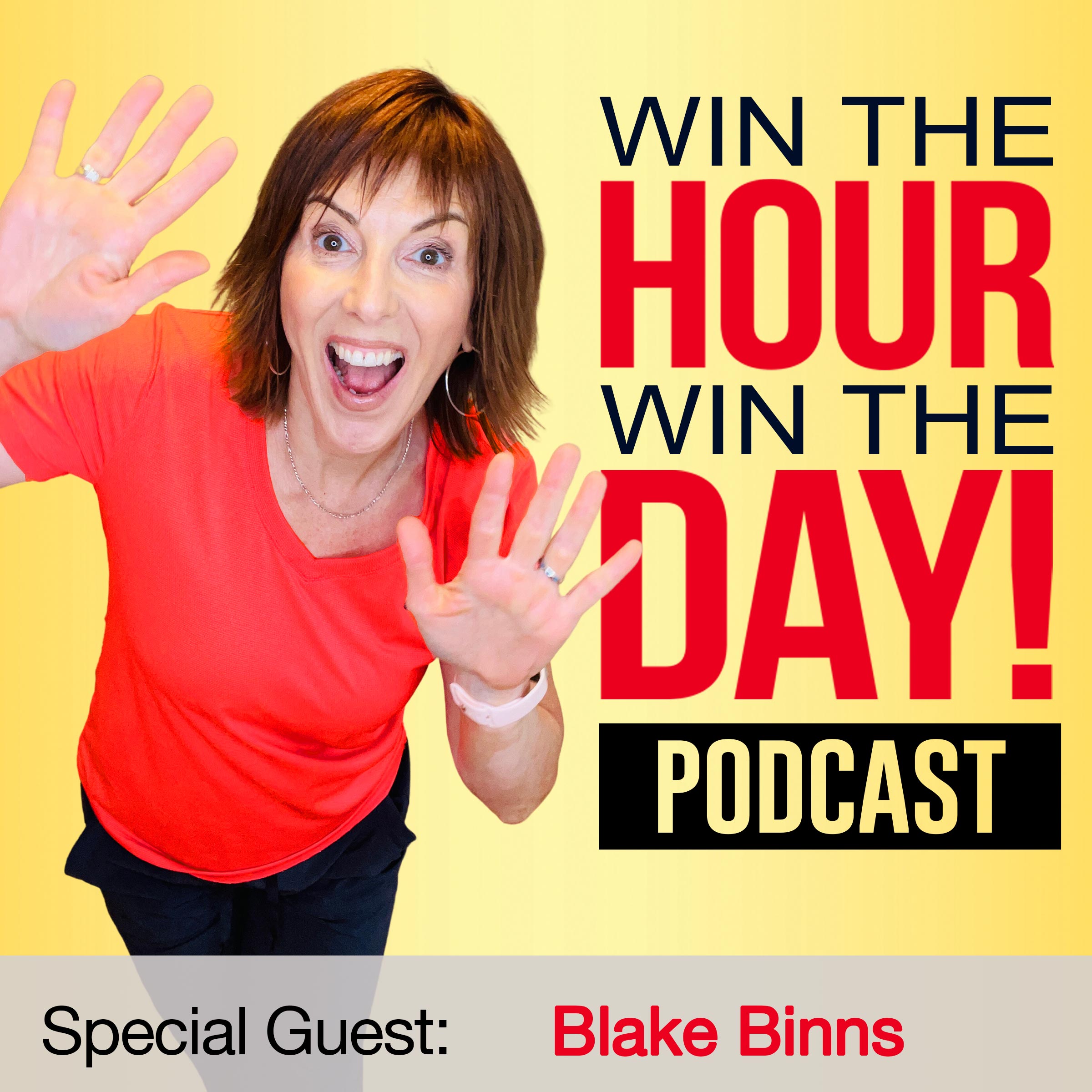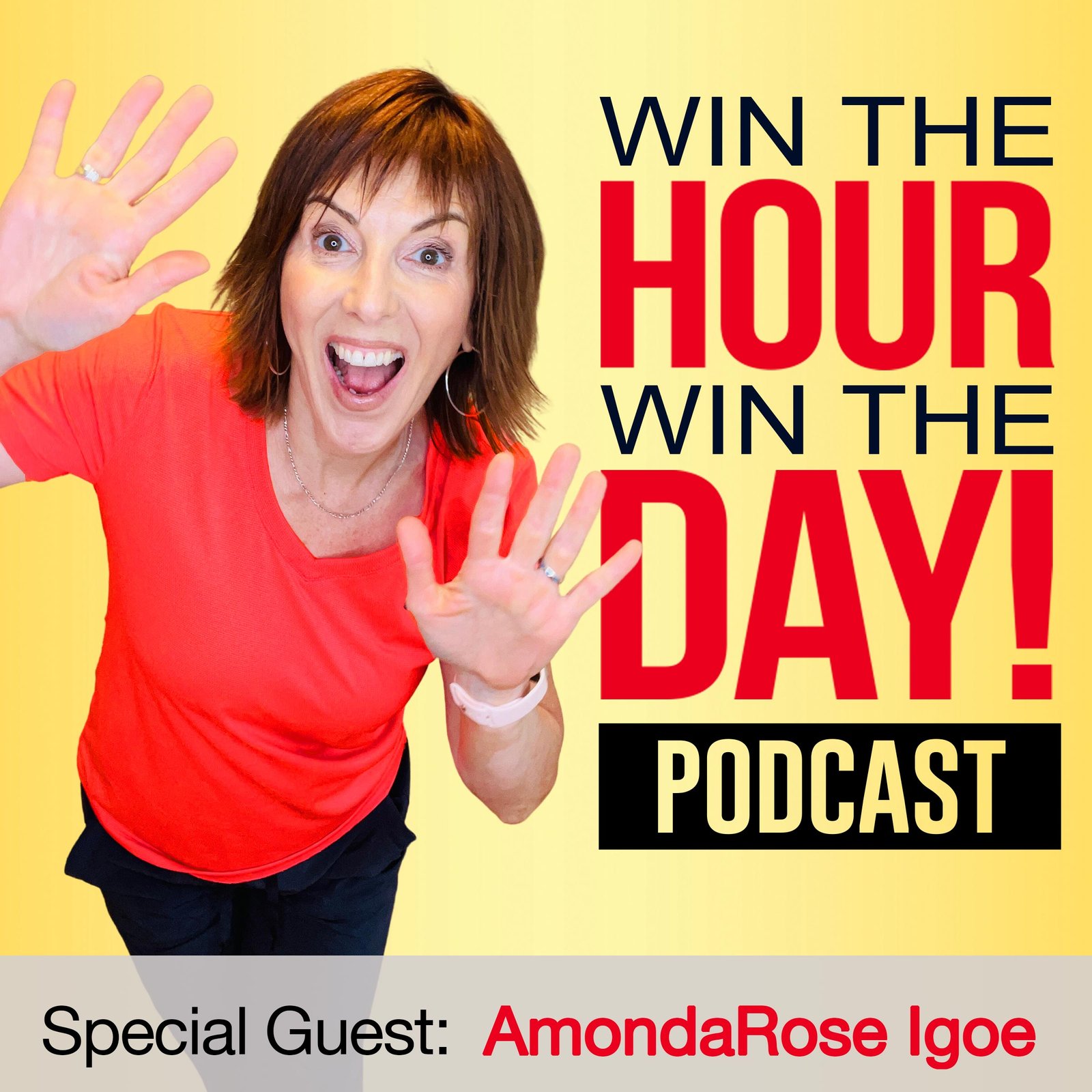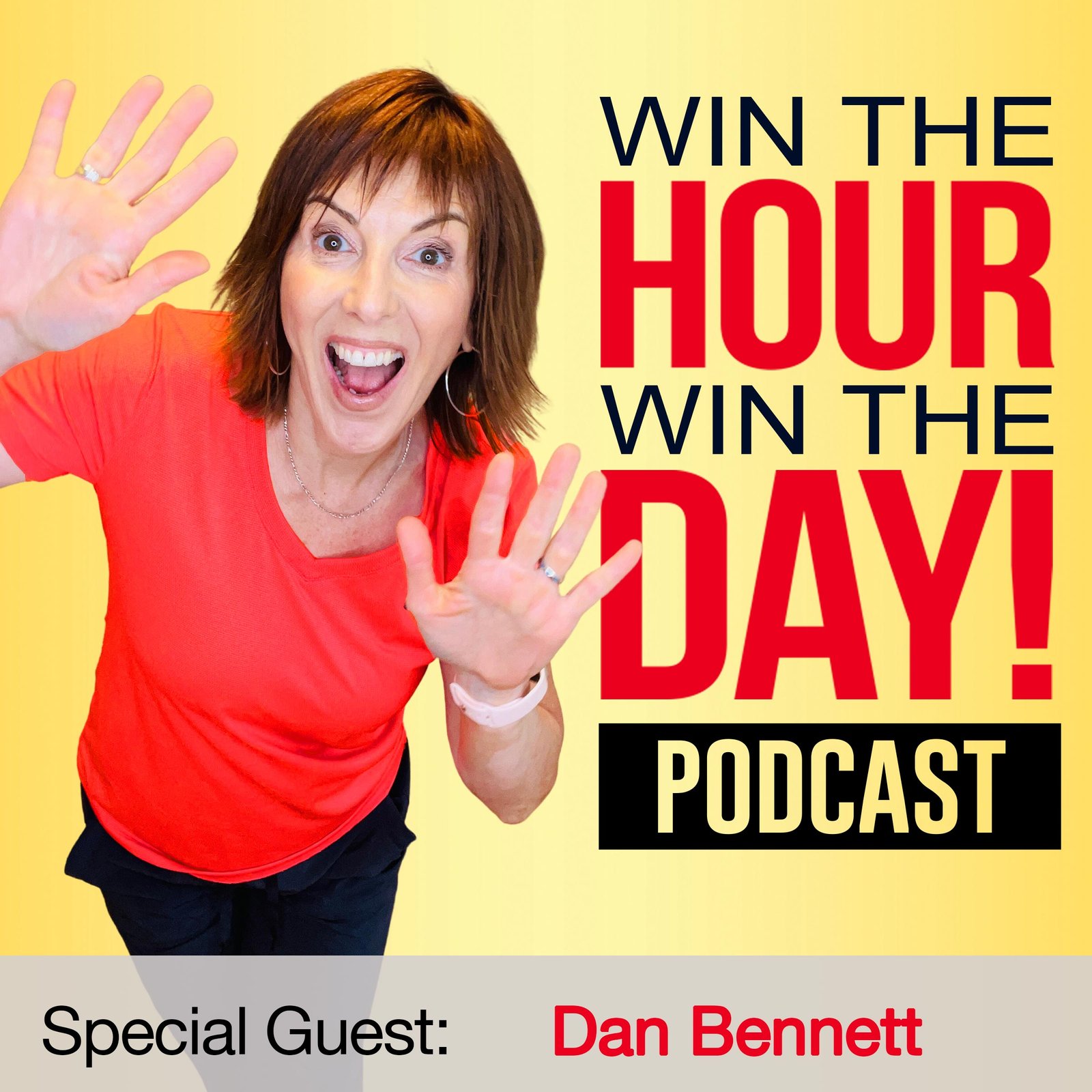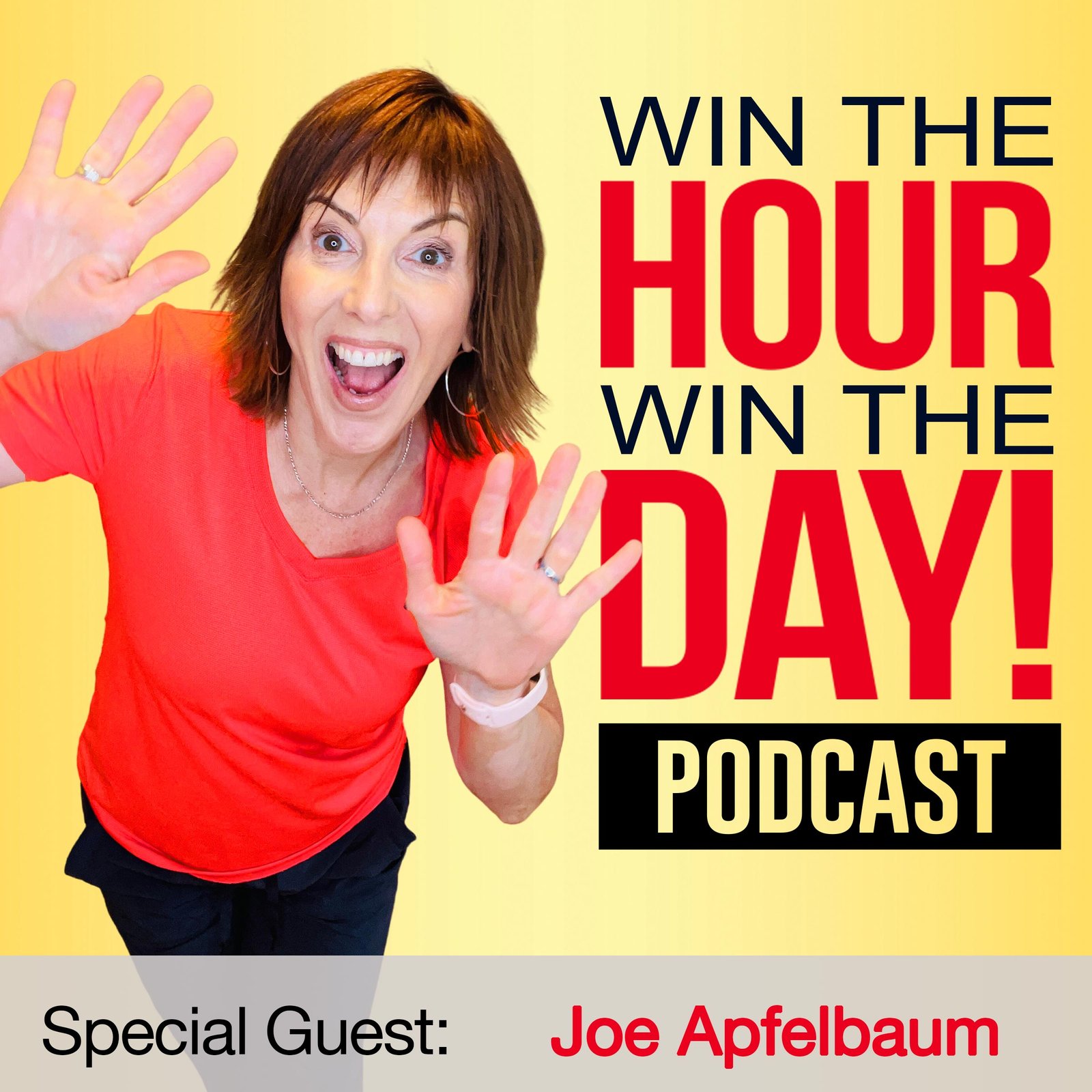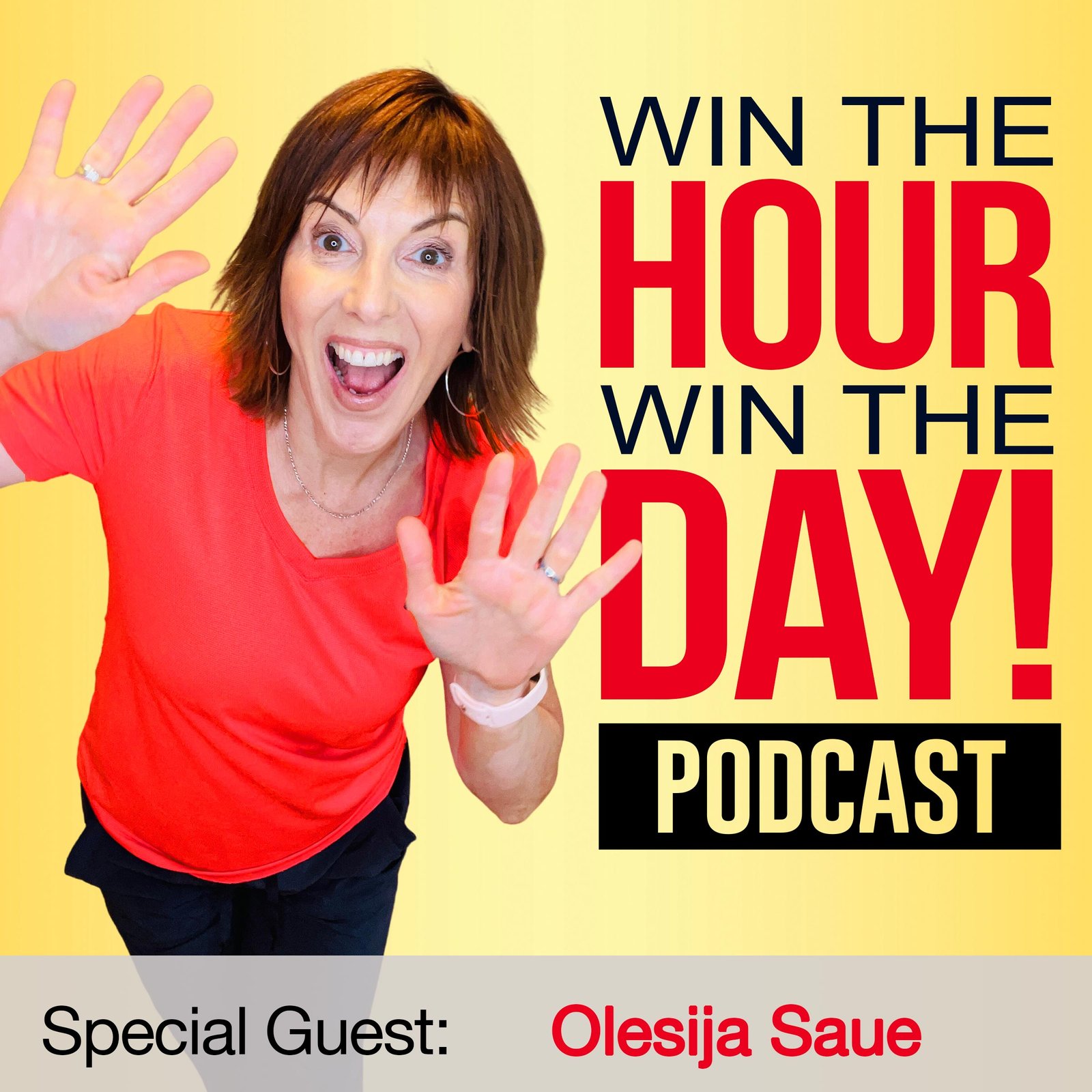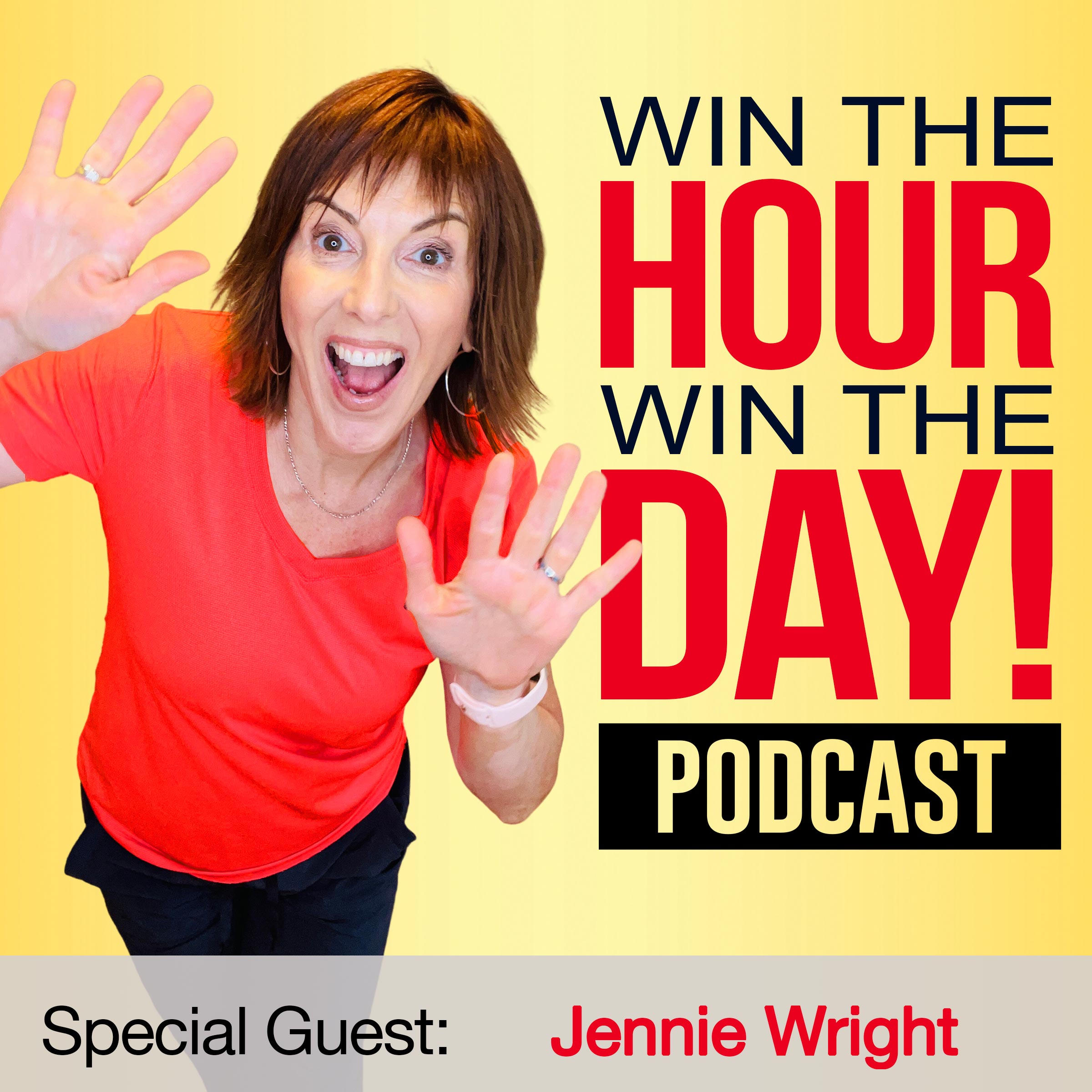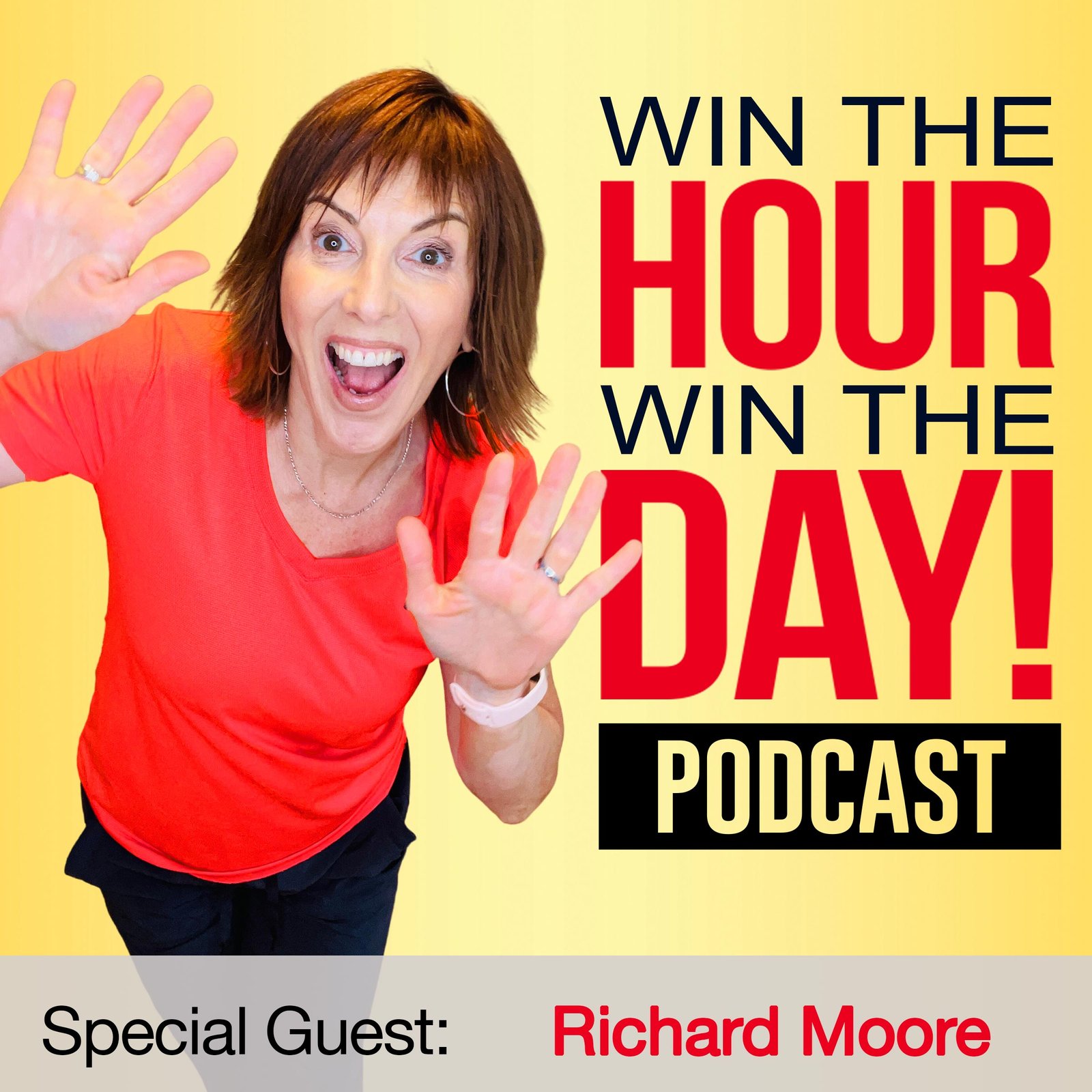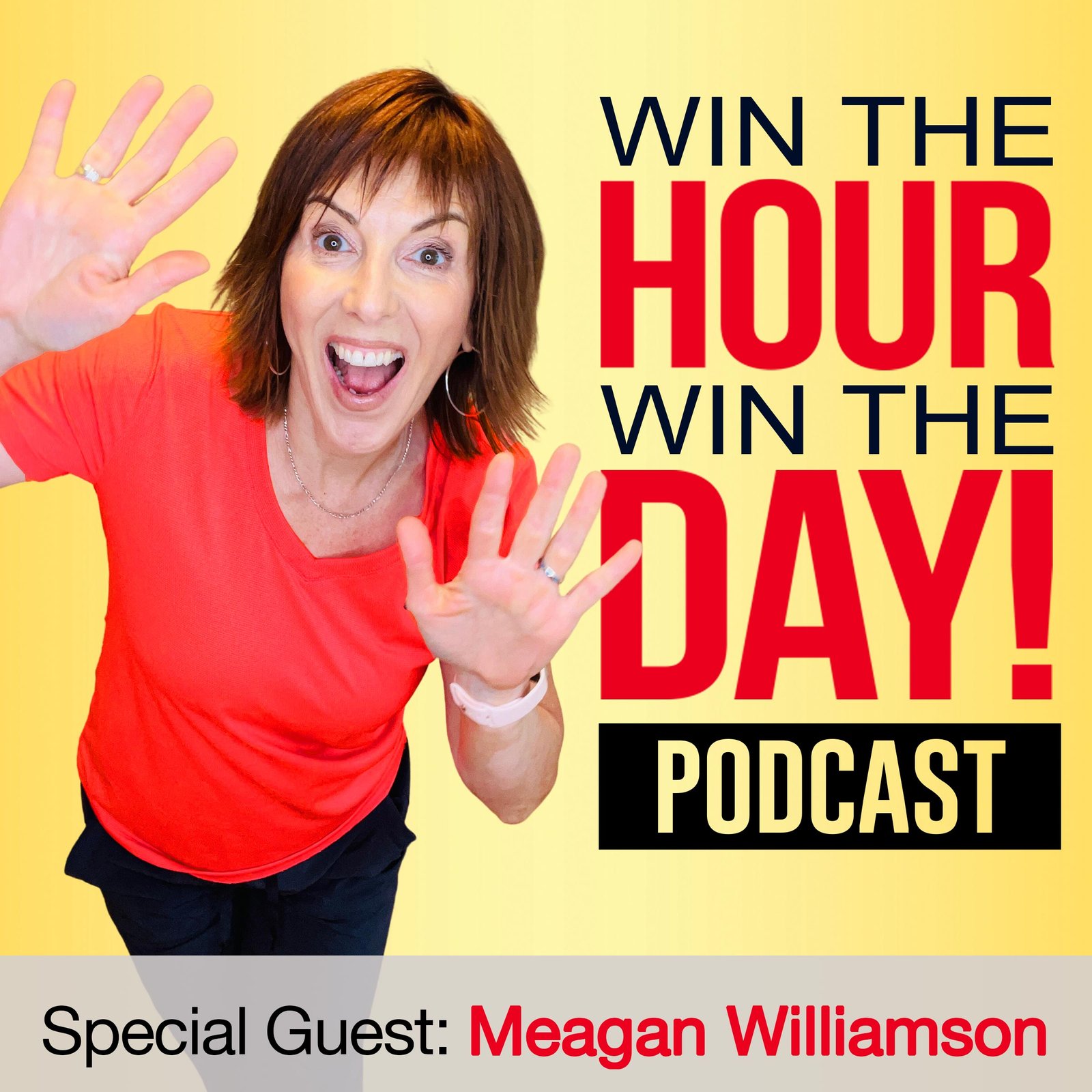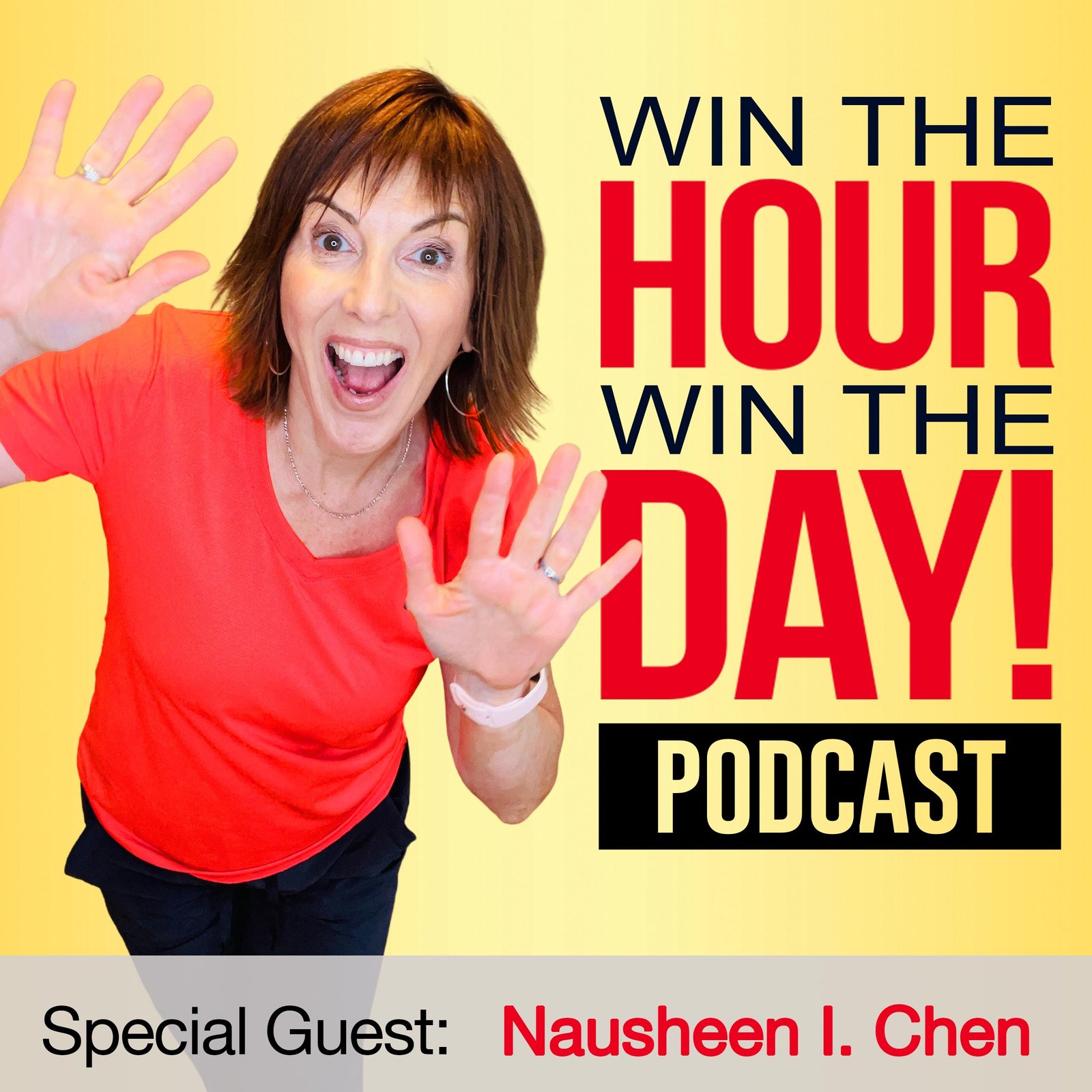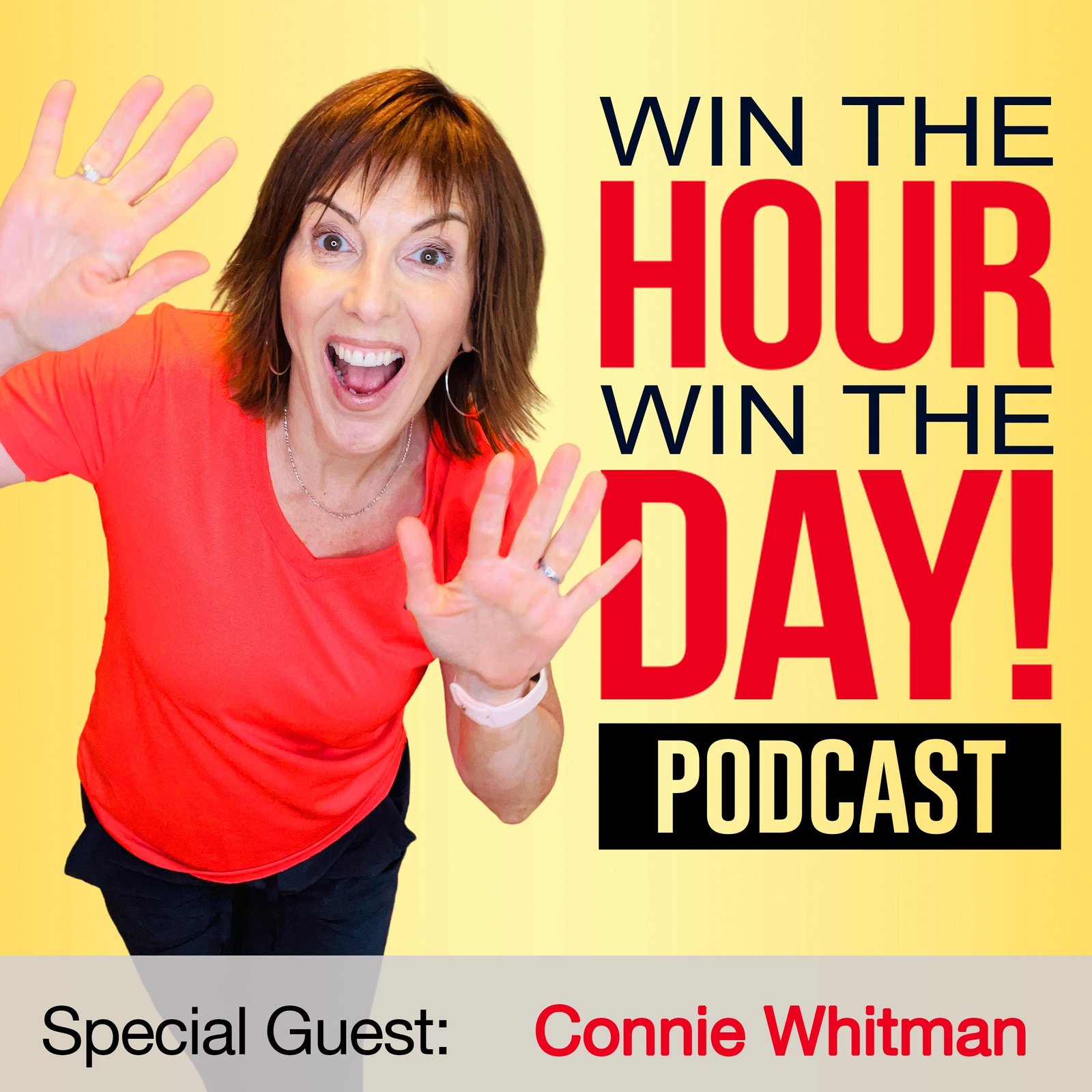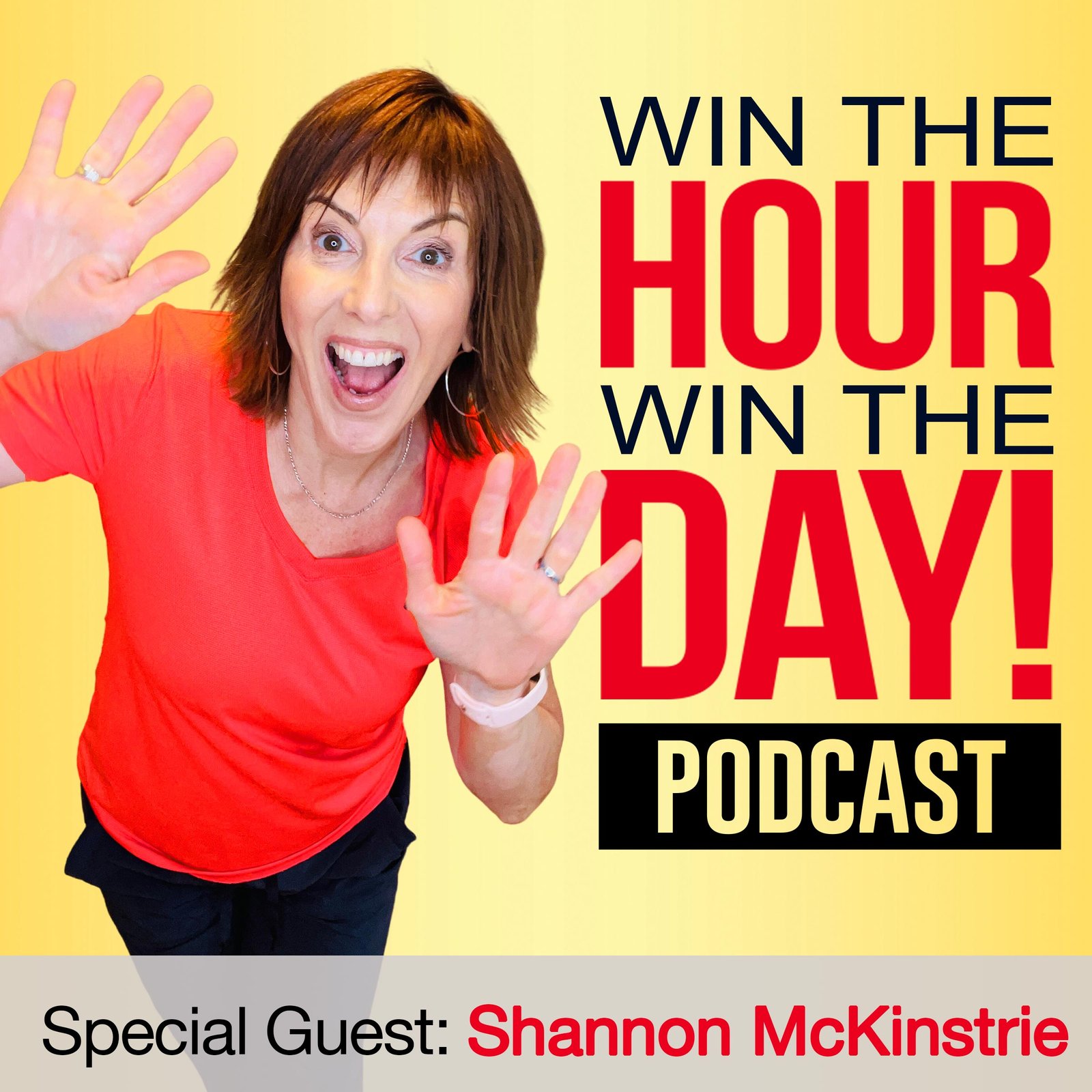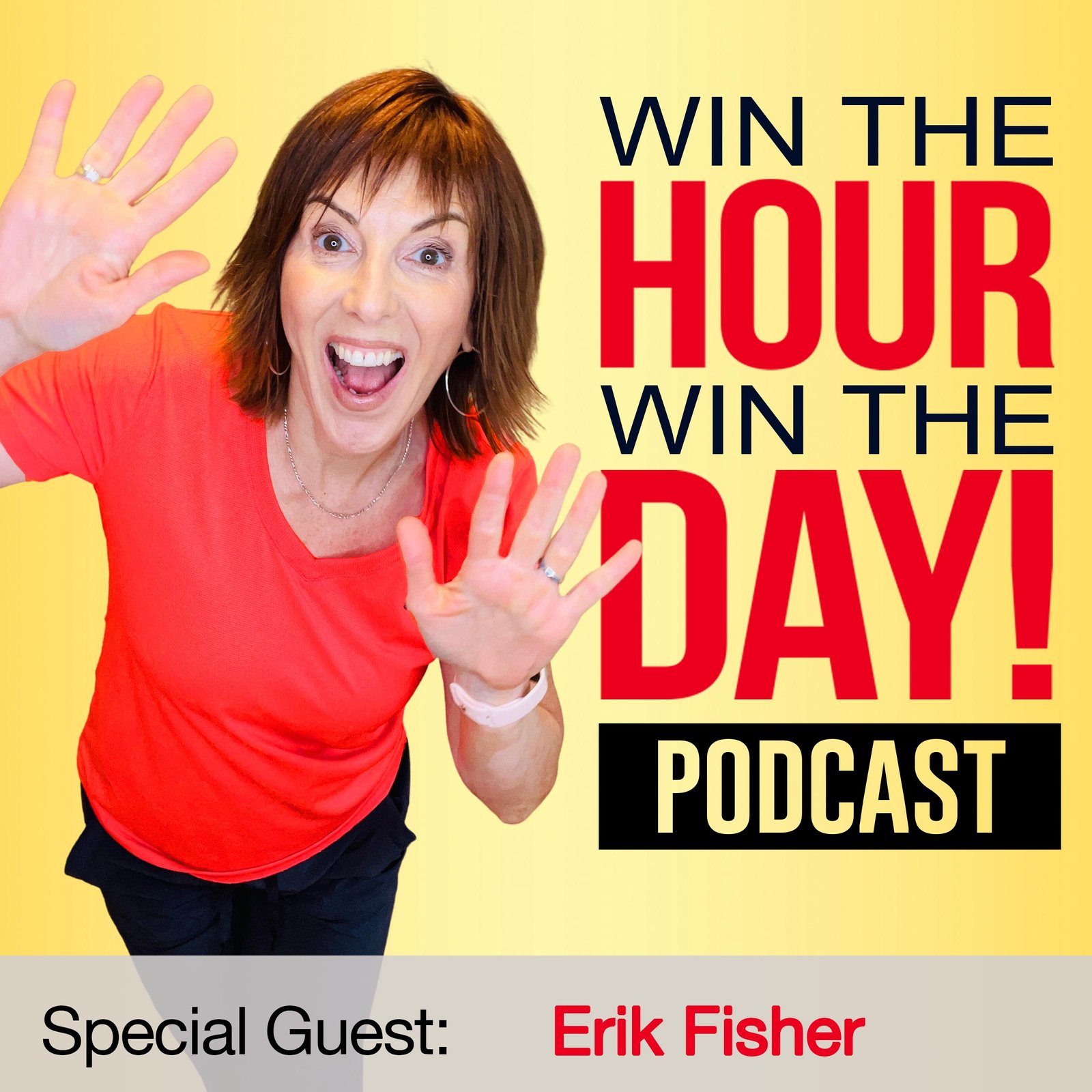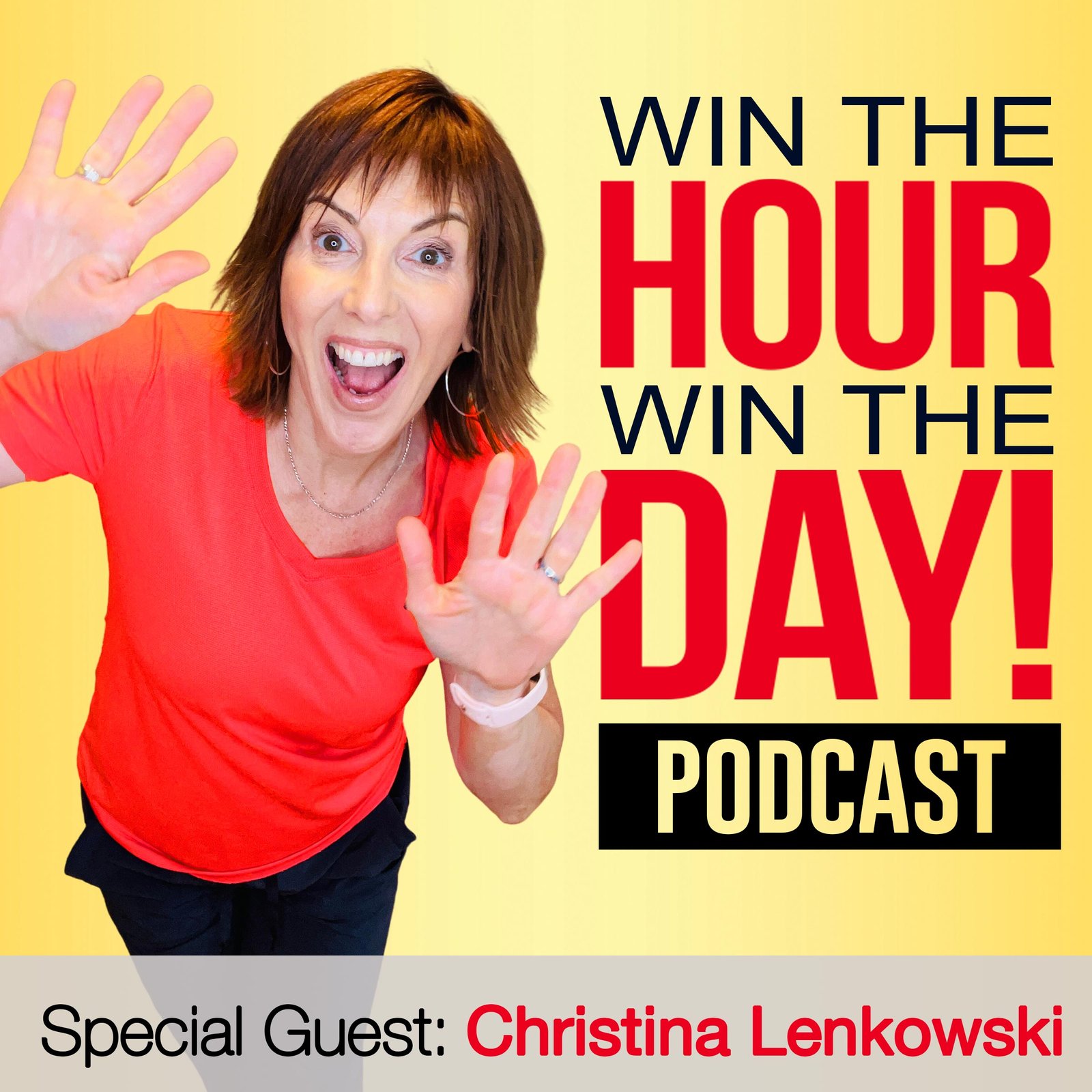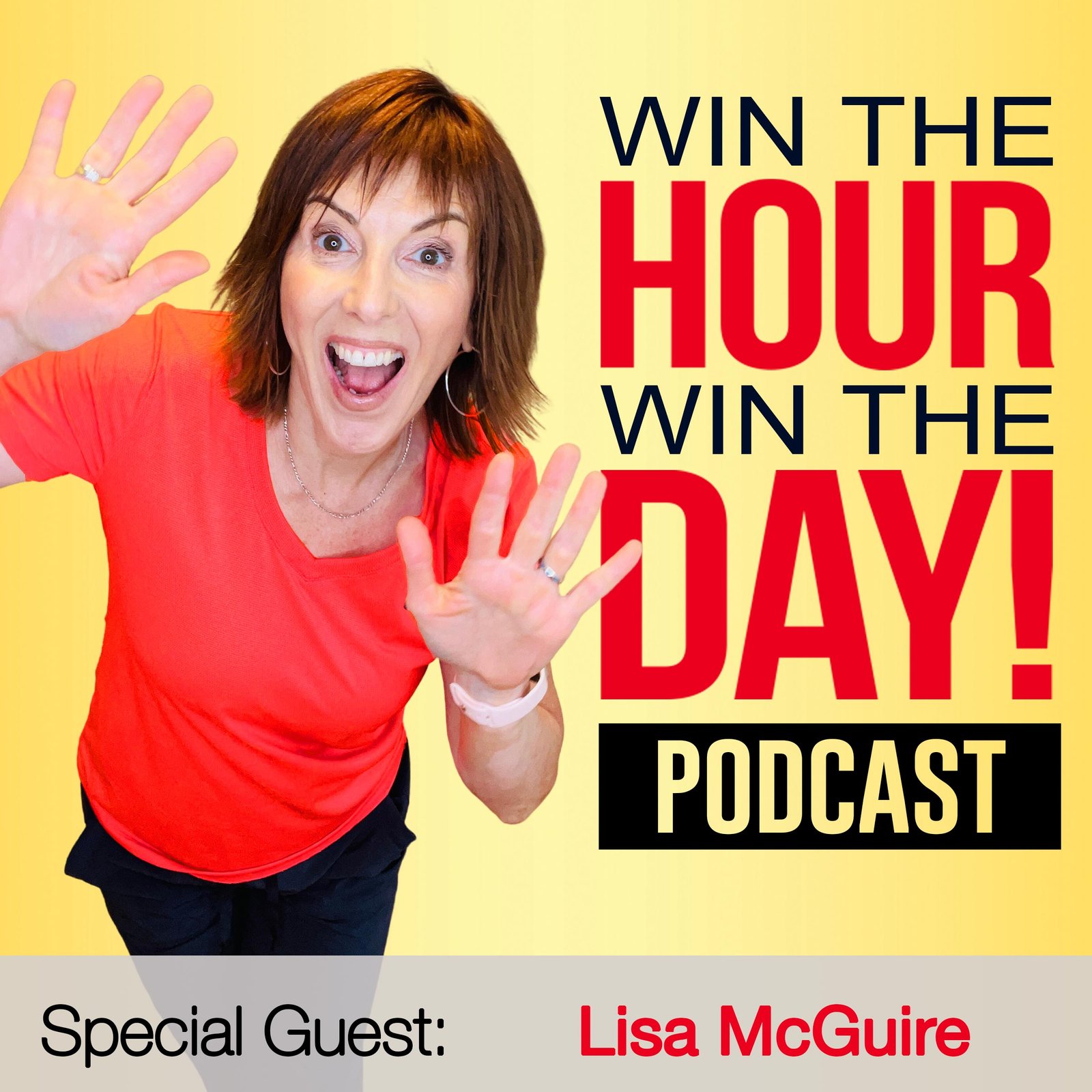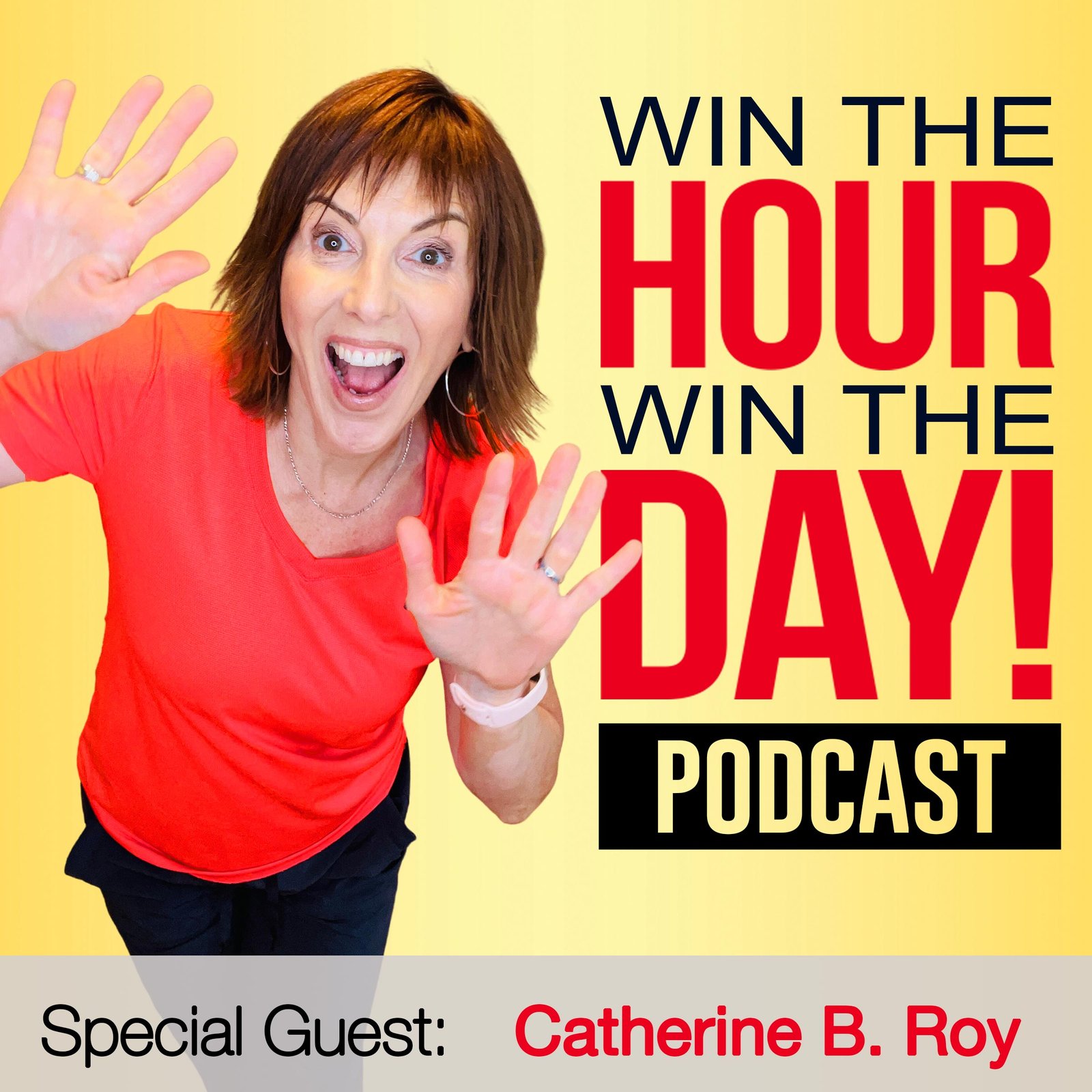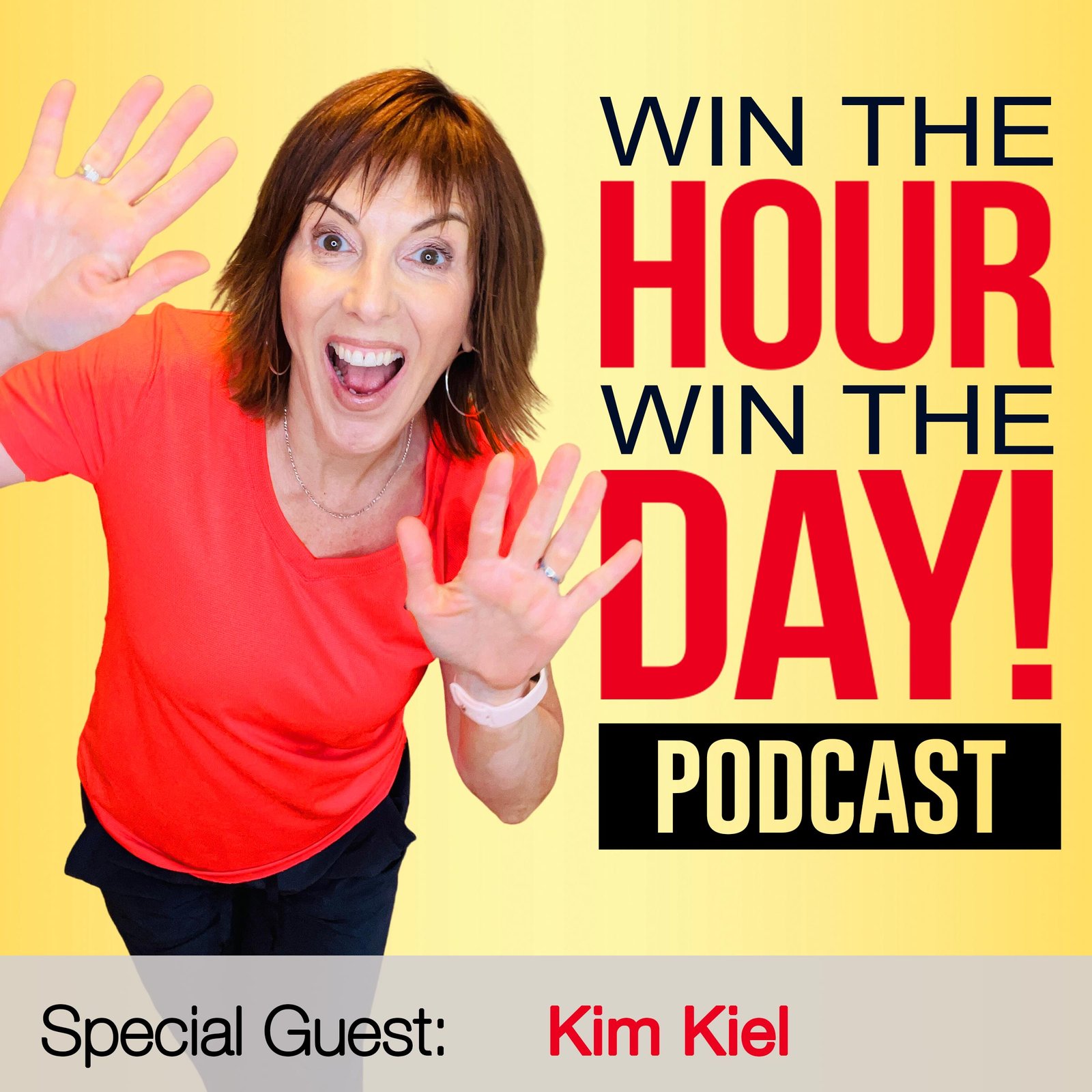Episode Summary This week’s episode of Win The Hour, Win The Day Podcast is...
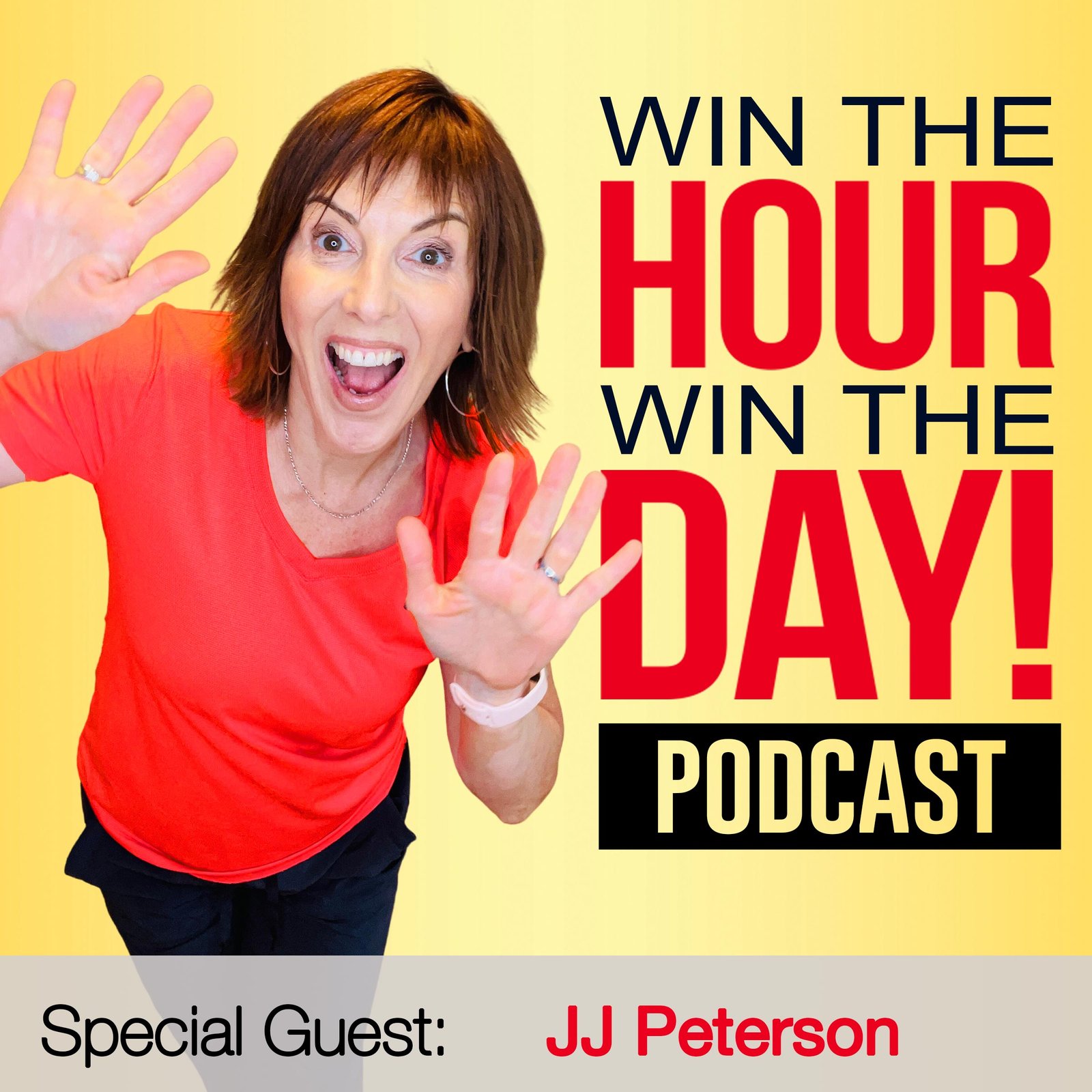
Are You Ready For Your Next Big Win?
Know your entrepreneur personality and I’ll take it from there!
Recent Podcast Episodes
Preventing Burnout with Smart Work Tools! with Kris Ward
Episode Summary This week’s episode of Win The Hour, Win The Day Podcast is...
Master Social Selling: Heidi Medina’s Strategies for Engagement
Episode Summary This week’s episode of Win The Hour, Win The Day Podcast is...
Boost Productivity and Master Storytelling! with AmondaRose Igoe
Episode Summary This week’s episode of Win The Hour, Win The Day Podcast is...
Master Video Marketing: Top Tips for Entrepreneurs with Dan Bennett
Episode Summary This week’s episode of Win The Hour, Win The Day Podcast is...
Boost Your LinkedIn Strategy with AI Tools for Enhanced Productivity! with Joe Apfelbaum
Episode Summary This week’s episode of Win The Hour, Win The Day Podcast is...
Mastering Personal Branding with NLP Techniques! with Olesija Saue
Episode Summary This week’s episode of Win The Hour, Win The Day Podcast is...
Innovative Lead Generation and Email Automation Secrets with Jennie Wright
Episode Summary This week’s episode of Win The Hour, Win The Day Podcast is...
PR Strategies for Diverse Entrepreneurial Impact! with Jennifer Singh
Episode Summary This week’s episode of Win The Hour, Win The Day Podcast is...
Convert More Clients on LinkedIn with Richard Moore
Episode Summary This week’s episode of Win The Hour, Win The Day Podcast is...
Master Business Growth on Pinterest with Meagan Williamson
Episode Summary This week’s episode of Win The Hour, Win The Day Podcast is...
24/7 Sales Boost: Video Marketing Secrets with Alex Sheridan
Episode Summary This week’s episode of Win The Hour, Win The Day Podcast is...
Master Public Speaking Tips with Nausheen Chen!
Episode Summary This week’s episode of Win The Hour, Win The Day Podcast is...
Beating The Burnout With Connie Whitman’s Success Story
Episode Summary This week’s episode of Win The Hour, Win The Day Podcast interviews,...
Craft Your Social Media Content Strategy With Shannon McKinstrie
Episode Summary This week’s episode of Win The Hour, Win The Day Podcast is...
Boost Your Productivity with AI Tools: A Deep Dive with Erik Fisher
Episode Summary This week’s episode of Win The Hour, Win The Day Podcast is...
Boost Visibility: Repurpose Content and Leverage Podcasts With Christina Lenkowski
Episode Summary This week’s episode of Win The Hour, Win The Day Podcast is...
Master Personal Branding & Storytelling with Lisa McGuire
Episode Summary This week’s episode of Win The Hour, Win The Day Podcast is...
Boost Business on LinkedIn with Catherine B. Roy’s Strategies
Episode Summary This week’s episode of Win The Hour, Win The Day Podcast is...
Scale Your Business: Optimizing Virtual Assistant Services with Kris Ward & Rachel Eubanks
Episode Summary This week’s episode of Win The Hour, Win The Day Podcast is...
Affordable PR Mastery: Crystal Richard Unveils Modern Techniques
Episode Summary This week’s episode of Win The Hour, Win The Day Podcast is...
Revamp Your About Page: Guide to Personal Branding
Episode Summary This week’s episode of Win The Hour, Win The Day Podcast is...
LinkedIn Mastery and Video Marketing Secrets with Alex Sheridan
Episode Summary This week’s episode of Win The Hour, Win The Day Podcast interviews,...
The Systems and Processes Playbook: Insider Secrets to Streamlining Your Small Business with Leah Abunales
Episode Summary This week’s episode of Win The Hour, Win The Day Podcast interviews,...
Getting Noticed: PR Strategies with Dina Behrman
Episode Summary This week’s episode of Win The Hour, Win The Day Podcast interviews,...
Mastering Business Storytelling with JJ Peterson’s Guide
Episode Summary
This week’s episode of Win The Hour, Win The Day Podcast is sponsored by Win The Hour, Win The Day’s Signature Coaching Program the Winners Circle. Kris Ward who helps entrepreneurs to stop working so hard interviews, JJ Peterson.
Let’s dive into the art of storytelling with JJ Peterson!
Learn how to make your business stand out:
-Discover the secret to telling great stories for your business.
-Understand why your customer should be the hero, not your company.
-Learn the simple steps to make a powerful story.
JJ Peterson shares expert tips to connect better with your audience.
Get ready for game-changing strategies!
Power Personality Quiz
http://winbacktimequiz.com/
Win The Hour, Win The Day! www.winthehourwintheday.com
Podcast: Win The Hour, Win The Day Podcast
Facebook: https://www.facebook.com/winthehourwintheday/
LinkedIn: https://www.linkedin.com/company/win-the-hour-win-the-day-podcast
Win The Hour, Win The Day Winners Circle: https://winthehourwintheday.com/winners-circle-masterclass
You can find JJ Peterson at:
Podcast: https://podcasts.apple.com/za/podcast/marketing-made-simple/id1569923210
Website: https://www.mystorybrand.com/?utm_medium=podcast&utm_campaign=brandscript&utm_term=mms
Win The Hour Win The Day
https://winthehourwintheday.com
JJ Peterson Podcast Transcription
[00:00:00] Kris Ward: Hey, everyone. Welcome to another Win The Hour Win The Day and I am your host, Kris Ward. And today in the house, we have JJ Peterson. He is the head of story brand and he’s here to talk to us about stories. Now I get it. We know we’re supposed to do stories, but I have a couple of concerns about that.
[00:00:17] And this is where things get difficult for me. So I can’t wait to talk to you about that. JJ, welcome to the show.
[00:00:23] JJ Peterson: Thank you so much for having me excited to be here.
[00:00:25] Kris Ward: Okay. JJ. I know you talk, I’ll let you explain it a while and tell you what you know, that’s always my favorite. Why don’t we start with the part where you’re talking about, if people identify the power and the movement of that arc of a story, and then I want to dive in with some concerns or questions I have about that. So why don’t you start us there?
[00:00:48] JJ Peterson: Storytelling, obviously, like everybody knows story is a buzzword right now when it comes to business and marketing. It’s you’ve got to tell a good story. And I actually think that most people are telling stories incorrectly. And the reason why is because most companies are trying to find those stories that are like heart wrenching or they’re just like these big kind of got to find that amazing story where this one person, changed their life and everything was different afterwards. So they’re looking for like the amazing hook story and they’re missing the point because there’s actually a much easier way to tell stories.
[00:01:28] Then the other mistake that they’re making is they’re making the story about themselves. When they’re trying to tell their quote unquote company story, they make themselves the hero of the story. And I believe that every company, every entrepreneur out there, when you’re talking about your company, you should actually be making your customer, the hero of the story, and that is a better way to connect with them because we all wake up every day.
[00:01:55] As the hero of our own story, we like, we just know this as humans. I am the hero of my own movie. You are the hero of your own movie. And if companies come along and they are trying to advertise to me and they’re positioning themselves as the hero of their story, and I am positioning myself in my life as the hero of my story, we are actually in competing stories.
[00:02:21] One of us is going to lose. And one of us is going to win. Cause there’s really only room for one hero in a story, but if companies can come alongside and position themselves as a guide in their customer’s journey and actually invite their customers into a story where the customer gets to be the hero, then the companies are going to win out in the end, people need to stop thinking of telling stories about making themselves the hero from a company perspective, making their company the hero.
[00:02:50] And how do you actually make your customer the hero of the story?
[00:02:54] Kris Ward: Okay. So two things that are really profound to me. One, you’re right. I, it’s not my jam to have heart wrenching gut, just painful stories. It’s just not how I navigate life. If I have pain in my life, I just want to move forward and move on to the, I just, I want to have, I want to be happy.
[00:03:16] So I want to have happy thoughts. And then there does seem to be this competition, like I lived in a village, it burnt down and then they came and they terrorized me and did horrible things and then we moved on and it’s just always how far down the toilet of life can we get? And I’m not minimizing people who’ve gone through horrible things.
[00:03:35] I’m just not good at sharing that. And then it does seem like there’s a competition for more and more graphic wretched childhoods. And I always think if your child was wretched, let’s move forward. And, let’s not live relive it if he didn’t like it the first time. I love that you said that because that always pulled me back from doing videos and stories because it wasn’t I didn’t want to be doing that, right?
[00:03:56] So that’s not the key. The key to creating emotion doesn’t need to be trauma and re traumatizing people, myself included.
[00:04:04] JJ Peterson: Okay. Not at all. The only time that you actually, to be very honest, should talk about your own trauma and your own story in the context, when we’re talking about relationship and friendship, that’s a different story.
[00:04:15] But when we’re talking about a business context, the only time that you should talk about your trauma or your struggle in the past is if your customer has experienced that same type of trauma or struggle. You want to move past the empathetic connection and move to a position where you are actually helping them overcome their own trauma and their own problems.
[00:04:42] If you continue talking about yourself, once again, you’re making yourself the hero of the story. And here’s the, here’s a really tricky thing that people don’t understand about stories is that in stories, in movies, in books, heroes are actually the weaker character in the movie. We think of heroes as being really strong, but if you really think about it, heroes are insecure, they’re overwhelmed, they’re afraid, they’re up and down in the movie, like they win a little bit, and they get cocky, and then they lose everything, and then They come back up and then they get too excited and they think they have this great plan and then they get defeated.
[00:05:22] It’s like heroes are up and down through the whole movie. The
[00:05:25] hero’s journey.
[00:05:25] Kris Ward: Wait, hold on a second here. You just totally destroyed my Rocky franchise, but continue. Okay.
[00:05:30] JJ Peterson: The truth is though, Rocky is weak. He loses even at I think at Rocky 2, right? He’s the underdog and we don’t know if he’s going to win.
[00:05:38] He’s insecure. Nobody can really believe in him because he’s up and down. So the hero’s journey. It’s actually a week journey because they’re looking for somebody to help them. Now, the strongest character in a movie is the guide, the person who helps the hero win. So Star Wars, it’s Obi Wan Kenobi or, or it’s Yoda in rocky. It’s his trainer, right?
[00:06:04] He’s the one who’s always confident. He’s been there done that one the day. And so when we’re talking about trauma or talking about stuff that we’ve experienced in the past pain, we’ve experienced in the past. It’s okay to mention that in a context of sharing the inviting your customers into a story and talking about yourself.
[00:06:24] You can share a little bit of it, but you have to move past that very quickly. In reality, if you’re building a relationship where people are going to pay you money to solve a problem.
[00:06:35] Kris Ward: Okay. Let me, can I jump in here for a sec? Yeah. So what I want to ask though, so a couple of things competing thoughts here.
[00:06:41] One. So it’s Oh, you know what? I was sleeping on the floor and here’s a picture of me with my can. And I didn’t have enough heat to heat up the beans. And I, but now I’m a quadrillionaire, right? And so I don’t know, I think that get for me, it doesn’t always resonate, but there’s that. So then if you say okay.
[00:06:58] And I’ve never been great at telling stories about myself to a fault. That’s been a criticism that I have received from a lot of people. So I’m okay with it not being about me. That works for me. So then, if I tell it about my clients, then is that, the criticism I got, it makes it third person and it’s removed.
[00:07:20] Okay, my client was here and now they’re there. And somehow that still sounds like it’s about me.
[00:07:26] JJ Peterson: It’s not. Okay. Let me break down and let me address a couple of those things. Then let me break down how story actually works. Okay. What you’re talking about is if you are, if let’s say you personally let me, I will use your example, your story.
[00:07:42] And the other piece of it that I know is about how you were working 16 hours a day and overwhelmed and burning out and hurting the people around you learned about that and then move forward. You share that much. What you do is you begin to create empathy for people who under who are experiencing that same thing.
[00:08:03] Now you were to share. I was I had a can of beans and I was on the floor. You’re expressing empathy to people who are maybe in that position. So when somebody doesn’t relate with you, because what they’ve said is I was, I had a can of beans was sleeping on the floor, but you’ve never experienced that type of loss.
[00:08:23] You go, why are they telling me that? They’re just making it about them because you’re not their client. You’re not their target audience, but when you can share empathy with if your target audience in a way that they can relate to it actually creates a connection between the two of you and let me take it out of this whole context and give you this example, if I want to lose weight and I go to a gym and I see a trainer and I say to that trainer Hey, I’d like to lose 30 pounds and that trainer goes, Oh, me too.
[00:09:00] That’s probably not a trainer, right? They’re like in the same place I am. They’re struggling. They’re like, Oh my gosh, I’m so overweight and I don’t know how to do it either. That’s empathy, but that’s probably not a trainer. Now, if I go to that same gym, I walk in, say the same thing. I find a trainer and the trainer, a different trainer, and that trainer lifts up their shirt and shows me their six pack and goes it’s all about self discipline fatty, right?
[00:09:25] Probably not my trainer because they have a ton of authority they want a, but they’re not, they don’t have any empathy go to that same gym. And I find a trainer and I say, Hey, I’d like to lose 30 pounds and trainer goes, Hey, I was in your same shoes. I was about 30 pounds overweight and loved eating ice cream.
[00:09:43] But I actually found a way to move forward, get in shape, and now I help others do that. Now we have a combination of empathy and authority together. And that’s what really makes a good guide. And the guide piece in a story is really powerful. Okay. Let me now, with that, let me go back and explain how story works.
[00:10:03] So story is actually going back to one of your original points is people think that story has to be all emotional and all over the top. The way that story actually works is very formulaic. And I’m about to ruin stories for people, okay? ruin movies. So I apologize right now of how I’m going to tell you how story structure works.
[00:10:24] And once I explain it, you’re gonna see this in every movie, every book you’ve ever read or seen. Here’s how it works. There are really seven main elements to a good story. Now, if we are writing a big screenplay, there may be like 32, 36, but really all stories that are good and clear have these seven elements.
[00:10:43] A part of them. The first element is that the hero of the story. There really is one main character or a group protagonist and very early on. You need to know what that character wants very quickly. You need to know that Jason Bourne wants to know who he has passed. And there, you don’t really know anything else about this character or a person wants to fall in love, or they want to get the raise, or they want to get back the girl or get back the guy, or, they need to destroy a bomb, right?
[00:11:13] There’s we know very early. And that’s really the first element is that there is a character who wants something. And it’s very clear. The second element. That this is now where the story actually gets good and hooks the audience is the main character has to encounter a problem. If there is no problem in the story, there is no story.
[00:11:33] There’s no hook to the story. So if Liam Neeson’s daughter gets kidnapped for the 8th time. And he gets that phone call, that’s like dad, and he goes to Europe to rescue her. And she goes, I’m just kidding. That’s a prank. Let’s go shopping and check out schools. And the rest of the movie is the two of them just shopping and checking out not a good movie.
[00:11:54] So the hook comes in that the main character has to encounter a problem. The bigger the problem, the bigger we stick around as an audience, the more we stick around as an audience to find out if the hero can overcome that, then the third step, the third element of good story is that the hero, then we as an audience know the hero can’t get out of this on their own and they need help.
[00:12:17] And that’s where a guide comes into the story, a coach, a mentor, an advisor. The wise old sage who comes along, who has been in the same position as the hero and has won the day already and is going to help the hero win the day and the way that they become a guide is with empathy and authority.
[00:12:36] They understand the pain the hero is going through, and they’ve also already overcome that same problem. And the fourth element is then the guide gives the hero a plan. In almost every movie, you will hear the words, what’s the plan or here’s the plan, because the audience needs to see that there is a way for the hero to win the day.
[00:12:58] Okay. The fifth element of story is that there is a moment that the hero is called to action. The hero is challenged. There’s usually like a timer that’s going to go off 24 hours. Or the money is going to disappear in two hours. There’s something that forces the hero to act for them to win the day.
[00:13:21] And then the sixth and seventh elements are what we call stakes. So there is failure stakes in the story, which means that it’s been forecast or foreshadowed what can happen to the hero or the world. If the hero fails or doesn’t take action. So the bomb’s going to go off and we know everybody’s going to die.
[00:13:41] But also we’ve been shown what a happy ending can be like, and we’re rooting for it success. So sixth element is failure. Seventh element is success. We know that the guy gets the girl that when the villain is defeated, the world is okay. All the, it’s been forecast of what this can look like, and that’s every story.
[00:14:01] It has to have those seven elements, a hero who wants something, who encounters a problem, who meets a guide that gives them a plan. That calls them to action and the stakes are shown that it can be either failure or success. And so what we do at StoryBrand is we actually take those elements of story and we show people how to do marketing in a clear way that invites customers into a story that they get to be the hero of.
[00:14:31] And so you need to create talking points. For social media, for emails, for website, for all of your brand messaging that have those seven elements. So you need to be able to clearly articulate what it is that your customer wants. And literally, what would they Google if they were looking for you? And that needs to be on your website.
[00:14:52] That needs to be in your email. That needs to be on your social media. So it’s very clear that this story is the customer story.
[00:15:00] Kris Ward: Okay. So hold on. Can I jump in though? Yeah. Okay. So what happens here? I think A, we talked about this before, we get hooked into the HESI gut wrenching. Then also, stories are more powerful when they’re told first person.
[00:15:14] So I think I got confused too, if it’s a story about my client and then I’m not telling it first person because it’s really not my journey, right? So I’m now like what’s his name? Oh my gosh. So does it all the narration? It doesn’t matter. The starshake redemption.
[00:15:29] Oh, yes morgan Freeman. I’ve become the Morgan Freeman of this story. You can proceed with the podcast now So what where I got lost is okay does have to be I wasn’t putting myself in stories enough It has to be first person. It has to be shorter So these seven elements can be you know, they’re gonna be expanded or contracted depending on the length of the story.
[00:15:48] So Instead of telling my story, like we have a client just recently and it was really, I’ve told this story before, but I think it’s a powerful one where lots of times when people meet with us to work in the winner’s circle, they do sometimes miss the first session. I don’t encourage it. I shouldn’t be saying this because I’m not like my time’s valuable.
[00:16:04] Don’t be everybody’s time’s valuable. Don’t be missing appointments. In this case, she missed the second one. And I was like, okay, who’s the fool. We’re not doing this again. And begged me for the third appointment begged me. Okay, fine. We did it. So she literally said her hair’s on fire. She was in business like 10 years.
[00:16:19] She was doing really well, making lots of money, working way too many hours, all this stuff cut to, we did help her on board, get some systems and processes in play within the year. Not only did her income quadruple, but the time she worked went down like to 1/5th of what she was working to the point that she went to Costa Rica for a month, and the person we found for her 5/6 us dollars an hour was able to maintain and run the company while she’s away.
[00:16:45] If I put that through your process. And then learn how to speak first person on it and making, touching all those points and then be where’s that part I already got confused where I’m not the, I would be the guide, not the hero. She’s the hero. I’m the guy. So it wouldn’t get diluted because it’s not my story like that’s what I’ve been told a lot like you have to keep.
[00:17:07] And I keep thinking how many stories can I tell about me because the pain point of what I did. Is a long time ago, I actually felt uncomfortable saying yeah, when I was really stressed out, my business was new. That was a really long time ago now. And so I’m out of those stories because if I was in chaos, why are you coming to me? Anyhow?
[00:17:25] JJ Peterson: So the way that I would, so the story you just told about the woman, you actually told it with a lot of the elements of the story. Okay. What of the story framework because you identified she wanted help. So that was what the character wants. She wanted help. The problem was she literally did not even have time to show up to two hour meetings because, like she skipped the first two or however many.
[00:17:49] Yeah. That’s how busy she was. The problem was she was so busy. That that I came, we came alongside her and did these things there. So you establish yourself. I got that. I actually had empathy because I used to be that person and I knew I could actually help her. Here’s how we helped her.
[00:18:06] We did it like this, and this, there’s the plan. She had to commit till the moment where she like was all in with the call to action. And then you gave me the positive stakes of, she was able to go to Costa Rica and leave her company in charge with somebody else, right? So you actually did you told the story in the framework now here’s there’s a couple things that I want to point out about this you didn’t maybe hit every specific point, but you told the narrative in that way.
[00:18:36] She wanted something She had a problem you helped her Here’s how you helped her and this is what her life is like now where that story becomes powerful Is in your marketing or your you’re on a sales call with somebody and somebody says to you, I don’t have the time to commit to this program. That’s how much I’m working. Now, you don’t tell your story. You tell her story this, you go, I have, let me tell you about, I don’t know what her name is, but let’s call her Catherine. Sure. Let me tell you about Catherine. Catherine actually had to miss the first two meetings because she was so busy and so overwhelmed. She was in your same shoes.
[00:19:15] So what you’re doing is you are telling your, you’re not even telling Catherine’s story in that moment. You’re telling that Customer story. Now, if you are talking to somebody who is I am the mom of five kids and yes, my work is crazy, but also my life outside of work is crazy. You’re going to tell her a different story of a different customer who had the same journey, but was a mom of five whose life was overwhelmed.
[00:19:42] So what you’re really doing in those situations. This is why, what I always tell people, like people come to StoryBrand and they’ll say, help me tell my story. And I go, yep, I can totally do that. But what actually I’m doing is in the moment, what they realize is you’re not telling your story. You’re not even telling your cus, your like former customer story or your, your current client story, what you’re doing in the moment is you’re actually telling perspective customer story, you’re inviting them into a story that they can see themselves in that.
[00:20:14] They go, Oh yes, that’s my story. So when you are telling your story, don’t tell your story, tell your customer story so that they can say, yes, that’s my story. So that’s why when you have those seven elements, what you’re doing is identifying what is it that your customer wants?
[00:20:31] What are the problems they’re experiencing? How do I position myself as a guide to them? What is my plan for them? What is my call to action for them? And what does success look like when they follow through? They end up in Costa Rica and they let their, somebody else run their company, or the failure is you’re going to continue to burn the candle at both ends.
[00:20:53] And you’re going to miss out on some amazing opportunities. Okay. And you’re hiding customers in and they go, yes, that’s my story.
[00:21:01] Kris Ward: So I think where I may be going wrong, because I’m just talking about me, I’m sure we all go wrong, but I’ll throw myself out there, is I think I would skim over or summarize that story because I’m a, I’m what I call a recovering rushaholic, I’m always rushing to the point.
[00:21:17] And then B, I think, Oh it’s not this, I don’t know how many people I’m like, sometimes I’m looking at big gurus on Tik TOK or whatever. And I’m like, Oh, they were alcoholic and DUI and I’m like I didn’t have that problem. Sorry. I’ve just don’t, I didn’t, I’ve led a very clean and boring life.
[00:21:33] So is that a bad thing? So then again, I’m skimming over the client story. Cause it doesn’t have that. Hey, look at me and I’m so now see.
[00:21:42] JJ Peterson: What you’re doing is when you see those people who are on Tik TOK and on Instagram and all this stuff, and they’re talking about their story all the time, if they’re making the story about them, then you are not going to identify with it.
[00:21:55] They’re like, this is, let me tell you, let’s go even into more detail. All, but if they were to say, again say for you back in the day when you were like, pulling your hair out, cause you were running, 16 hours a day, if somebody was to say I used to read 16 hours a day and I was actually not only burning myself up, but everybody around me and I figured out a way to move beyond that.
[00:22:19] I can help you like that would perk you up because you were not struggling from addiction or those kind of things. So when they’re telling those stories, what they’re doing is they’re honing in on the type of client and person that they want to work with. And to be honest, you’re not it, right? Telling that story.
[00:22:38] But if they were to say, even now you know what, if I was trying to work with you personally, I might say something like. So many companies have this amazing product. They’re growing like crazy, but they just are telling the wrong stories. And actually they’re really uncomfortable telling the stories that they’re telling.
[00:22:56] Okay. Now what I’m doing is I’m identifying your quote unquote problem. And then I would invite you into a story that you get to win. And that’s really where the power of all this is. So understanding story. So I know we’ve talked about a lot, but the, if we get back to the bottom line is people, I think.
[00:23:16] Need not need to, but I would encourage people to stop getting overwhelmed by the idea that I have to find these like heart wrenching stories to tell in order to grow my own business. What you need to do is understand your customer story. What is it that they want? What are the problems they’re experiencing?
[00:23:36] How do you help them overcome those problems? And what does their life look like if they don’t work with you or if they do? And when you begin to talk about that on social media, in emails, in the way that you get up on stages, when you can use those talking points, what you’re doing is you’re inviting your customer into a story that they get to be the hero.
[00:23:57] And they pay you, frankly, to help them solve their problem because they need to win their story and the last kind of piece I want to say about that is why that’s so important is so my PhD is actually in a narrative marketing. I studied narrative marketing and narrative theory and in in academia there’s a theory called narrative transportation.
[00:24:21] The idea behind narrative transportation is that when we as an audience or as people experience a story that we can see ourselves in, we actually put our, or when we experience not even see ourselves, when we see a good story, we put ourselves in that story. So if you’ve ever watched a movie and cried or watched a movie and jumped or like I felt, like all the feels when they all, when they, the home run gets hit or the you’ve experienced what’s called narrative transportation.
[00:24:56] You’ve actually put yourself emotionally in the story. Now that is so the better the story, the more narrative transportation people experience.
[00:25:07] The research goes further and shows that the higher levels of narrative transportation that people experience, the more influence that story has over their thoughts and their actions. So books, movies have the ability to change how we think and how we act when we can actually put ourselves in a story.
[00:25:29] And the way you put yourself stories if it’s a good story. Now, the research goes even further to show that narrative transportation. We all know that we’ve experienced in movies and books like where that happens, but it also happens in marketing and narrative transportation where people can actually see themselves in the story can happen on a website, it can happen in emails, it can happen on social media where people start to see themselves in our marketing.
[00:26:00] And the, and then so what it all boils down to is the better the story, the more clear the story that really is about the individual, not about the company, about the customer, their desires, their problems, the plan that will help them and of casting a vision of success or failure for their story.
[00:26:20] The more narrative transportation they will experience, therefore, the more influence that we’ll have over their thoughts and actions.
[00:26:28] Kris Ward: I think. I have definitely had this conversation, but wasn’t as enlightened before. And I think I did understand that we shouldn’t be the hero and I didn’t want to be the hero.
[00:26:38] But I also think that you shed a more powerful light on the potential of the guide. So I heard that before. We should be the guide. Great. Okay. Excellent. Like I’ll be, I’ll do it. I’m done. What’s next? But I think you’re, and I also wonder, you came into this world with that soothing voice.
[00:26:54] So I don’t know if it makes your stories more interesting too. And not all of us have that. My husband used to say you’re getting shrill again, babe, right? So I think there’s all these components, but I think it is more inspiring, is more hopeful and that you’ve changed the ingredients to what does make a good guide.
[00:27:12] So I think that’s all very hugely enlightening. It also reminds me like the Nike commercial where they have people of shapes and sizes, ethnicity working out in the gym, sweating it out. They’re not, they moved away from the, all the famous athletes. No wonder. Cause they all ended up in prison or they weren’t having luck with them, but. Dr. Woods, OJ, whatever. But when they just had the regular people, that’s them making you the hero in their commercial, correct?
[00:27:41] JJ Peterson: Yes. Exactly. Exactly. And when they use athletes, it’s a different type. It’s really an aspirational hero. So it’s I want to be like Mike, Michael Jordan, so it’s those kinds of things are still there, but they’re moving towards a different audience.
[00:27:55] Whereas before they were really going after athletes and now they’re going after the everyday person and telling them to just Not be afraid. So yeah, there’s, it’s, there’s a lot of examples, even, like apple. It’s so interesting. If you watch apples marketing it’s the ones. The campaigns that fail are the campaigns that focus on the product and talk about the features and benefits of the product.
[00:28:17] The campaigns that we remember in the campaigns that are amazing are, and do skyrocket their sales are the ones who show the product, but really they’re talking about the people who are creators, who are inventors. Who are life living, right? I don’t know if you remember back in the day, way back in the day, there was this like commercial with Richard Dreyfuss, who was like his voiceover.
[00:28:43] He was the Morgan Freeman of the commercial, but he was like saying, we are the creators, the dreamers. And there was all these black and white pictures of Gandhi and Martin Luther King and Rosa parks and all these people, and they never once showed a single apple product, but what they were doing was inviting people into a story that you get to be the people who fully get to live and fully get to create and maybe you’re a little misunderstood, but you are the type of person who wants to make a change in the world.
[00:29:13] Who doesn’t feel that way? Who doesn’t feel a little misunderstood, but wants to be a world changer? Yeah. Yeah. That’s my story. Yeah. They didn’t show me an Apple computer. They didn’t show me a watch. They didn’t show me a phone. They showed me Martin Luther King and called me to be a creator who could change the world.
[00:29:28] They, the Apple makes the customer, the hero better than anybody else out there. And they’re dominating the world with it.
[00:29:36] Kris Ward: Oh my gosh. Oh my gosh. You’ve inspired me. J. What a treat. The time just I just whipped by, I’m devastated. Oh, we’ll have to do this again. Story part two. Gather around children. J. Absolutely. Yeah. Okay. Where can people find more of your brilliance?
[00:29:53] JJ Peterson: I Have a podcast called marketing made simple as well that you can listen to. And if you’re interested in kind of beginning the process of exploring how to create your company story, using the story brand framework, like using those seven elements, people can actually go to storybrand.com/sbseven, that stands for StoryBrand seven. So StoryBrand.com/sbseven. And we have there what’s called a brand script. And basically it has these little boxes that has the seven elements that I talked about. So you can begin the process of writing the talking points for your customer journey and customer story and help you clarify that message and make it really about your customers, the hero.
[00:30:37] So StoryBrand.com/SBseven.
[00:30:40] Kris Ward: Oh, my gosh. That will definitely be in the show notes. Everyone share this with a business buddy. Business buddies don’t let others suffer alone. They need to hear this. This is very enlightening and we will see you in the next episode and thank you again, jJ.
[00:30:53] JJ Peterson: Thanks for having me.

